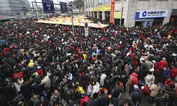China's soil deterioration may become growing food crisis, adviser claims
 Chinese people crowd at a long-distance bus station in Nanjing, China, where rapid rates of urbanisation are putting pressure on food supply. Photograph: APChina faces struggle to feed population as pollution and urbanisation threaten supply, says government expert.
Chinese people crowd at a long-distance bus station in Nanjing, China, where rapid rates of urbanisation are putting pressure on food supply. Photograph: APChina faces struggle to feed population as pollution and urbanisation threaten supply, says government expert.The quality of China’s overworked, polluted and artificially fertilised soil needs to be protected or the country could struggle to grow enough crops for the 300 million to 400 million people who will move from the countryside to the city over the next 30 years, a senior government adviser warned today.
Han Jun, an expert on rural policy at the Development Research Centre, said maintaining food security was a major challenge in the process of urbanisation as farmers moved off their fields and into cities, where the consumption of meat, grain and diary products was higher.
In the next three decades, he predicted the share of urban residents in China’s population would rise from 47% to 75%, which would require the clearance of land for residences, roads and other infrastructure.
Noting that China feeds 22% of the world population with only 10% of the planet’s arable land, he said the pressure was growing.
“The deterioration in soil quality is now a very important problem,” Han told reporters in Beijing. “I believe improving the quality [of soil] is of equal importance to protecting the amount of arable land.”
The main causes of the decline are inappropriate farming techniques and industrial pollution. Han, who has helped to draw up the cabinet’s rural policies over more than seven years, said more than twice as much nitrogen fertiliser is used on the average hectare of Chinese farmland as the global average.
Factory waste, including heavy metals and other toxins, has contaminated more than a tenth of the country’s farmland, he said.
The government said earlier this monthn that it would draw up countermeasures, when the country’s first pollution census revealed farm fertiliser was a bigger source of water contamination than factory effluent.
The risks of inaction are well known. Han, who comes from a rural background, said farmers do not use pesticide, fertiliser and other chemicals on crops they grow for their personal consumption.
But he warned that it was unrealistic to expect a population of 1.3 billion people to maintain food self-sufficiency without artificial boosts for production.
“It is possible for us to use less fertiliser, but impossible not to use fertiliser at all,” he said. “We are now trying to guide farmers to use it in a more scientific way and to use more natural fertiliser from their households.”
More radical steps are also being taken to increase production, both by the government, which recently approved two new strains of genetically modified rice, and by agricultural entrepreneurs, who are buying and cultivating land in neighbouring countries such as Russia, Kazakhstan and Kyrgyzstan.
Responding to concerns about the cross-border expansion of Chinese farming, Han denied the government was involved.
“We don’t believe that going to rent and farm in other countries is a reliable policy option,” he said.
Yet despite strong grain harvests for the past six years, China is increasingly dependent on overseas markets for oil crops. Last year, Han said the country imported 42m tonnes of soya, which means vast areas of land in the US, Brazil and Argentina are now devoted to supplying the Chinese market.
This trend is unlikely to change. The Chinese government does not want to move towards the mega-farms seen in many other countries because a plot of land is a form of social security for the 850 million registered rural residents.
But as more of them are encouraged into cities with housing, education and other incentives, Han said the government needed to keep a watchful eye on food stability.
“We cannot be complacent. We know supply-and-demand is vulnerable,” he said. “We have a forced balance now that requires strong intervention by the government. This is a tense balance that can be easily broken.”
You can return to the main Market News page, or press the Back button on your browser.

